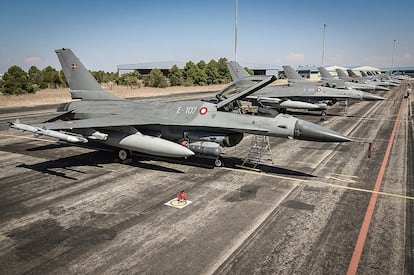Argentina reinforces ties with the US with purchase of used F-16s
President Javier Milei chose this option over China’s offer of newer aircraft with better weapons, at a time when Washington is trying to curtail Beijing’s influence in Latin America


On Tuesday the government of Argentina will formally sign the contract to purchase 24 U.S.-made, second-hand F-16 fighter jets. The combat aircraft are about 40 years old and are being sold by Denmark, which is going to replace them with the more modern F-35s. The decision by Argentina President Javier Milei to choose the American-made but used aircraft over China’s offer of new JF-17s with better weapons equipment was ultimately a geostrategic one: the United States is interested in stopping China’s advance in Latin America and Milei is interested in being appreciated as an unconditional partner of Washington and Israel. Unlike his predecessors, the Argentine president has chosen to distance himself from the Asian giant without regard for the commercial and financial ties that exist between the two countries. Defense and aviation experts have defended the choice of the F-16s, which will start being delivered in 2025, but they have also warned that there is a second pending contract with the United States that is key: the weapons system with which the airplanes will be equipped. The total estimated cost is around $360 million, which Washington will partially finance.
Years ago, Argentina began the search for aircraft that would allow it to recover the supersonic capacity it lost a decade ago, when it decommissioned the Mirage with which it fought in the Falkland Islands war in 1982 against the United Kingdom. The biggest obstacle was always the British veto. London opposes the sale of any military equipment containing British components to safeguard its dominance of the South Atlantic islands against Argentina’s sovereignty claims over them. That veto forced Argentina to discard the Swedish-made Gripen, one of the options under consideration, and it also ruled out the Super Etendard that former president Mauricio Macri bought with the argument of repelling a possible attack during the G-20 summit held at the end of 2018. The British refused to sell spare parts for the seats, and those planes were never able to take off.
The most competitive offers that the Argentine government had on the table were the Danish F-16s and the JF-17s offered by China. The F-16 are multipurpose aircraft, that is, they can carry out a wide range of tasks, from air combat to attacking ground targets. They are fast, easy to maneuver and have been used by the air forces of almost 30 countries. “They have in their favor that they are airplanes with a very proven system, with more than 50 years of experience,” says Andrei Serbin Pont, a security and defense specialist. The JF-17s, on the other hand, have more modern technology and China was willing to deliver them with a range of more modern and longer-range weapons. But the security expert notes that “the JF-17 generated doubts about its logistical support because it was a poorly tested system, and because of its modernization costs.” The purchase of military aviation, he adds, is always a long-term bet that requires guarantees that the supplier will provide training and spare parts.
“The first offer from the United States for the F-16s was not very good because it included only airplanes with very basic weapons,” says the historian and defense analyst Santiago Rivas. “That is why Argentina began to move forward with China, which offered weapons of all kinds and made that offer more tempting, although it had the drawback that it was a totally unknown system that is only used by Pakistan, Myanmar and Nigeria, and it implied the risk that if it could not be adapted, it would be out of service,” adds Rivas, who is the editor of a magazine specializing in military aviation, Pucara Defensa. “As a result of progress with China, the United States greatly improved its offer and included air-to-air missiles, surface missiles, advanced target recognition and electronic warfare equipment.”
The diplomat Diego Guelar underscores that the sale also entails the end of the British veto thanks to the fact that the United States fought “tooth and nail” to ensure that China does not become a major arms supplier in Latin America. “The JF-17 is a good product and China was facilitating credit and providing weapons,” says Guelar, who served as Argentine ambassador in both China and the U.S.
Deterrence capability
In its first months, the Milei administration has applied severe cuts in public spending on pensions, education, health, science and public works, in contrast with its significant investment in defense. Why does Argentina need fighter planes? At a time when the world is experiencing an escalation of war, they represent a deterrence tool against potential external threats. The F-16s that will arrive in Argentina have been modernized and maintained in very good condition by Denmark. Despite their age, experts agree that with them the Argentine Air Force will once again be among the most advanced in the region, only behind Brazil and close to Chile.
Given the bad experience of previous acquisitions, lingering doubts will only be dispelled once the deal with the United States has been signed. The most memorable experience involves 30 Fightinghawk fighter jets purchased by the neoliberal president Carlos Menem in 1997. “Then weapons were not negotiated, just airplanes were purchased, and it was proposed that the weapons would be purchased later, but that never happened,” recalls Rivas. “For the summit of presidents held in Mar del Plata in 2004, the United States delivered some missiles, very few.” This expert says there were initial fears in the Armed Forces that the same thing would happen this time around.
Of the fighters purchased by Menem, “eight remain in good condition,” said the former defense minister Jorge Taiana a few days ago. The veteran politician stressed that Argentina had a real need to recover its supersonic capacity, and he welcomed the fact that the United States authorized a purchase for which the United Kingdom did not exercise its veto. Still, he made it clear that the move is also very convenient for Washington. “The goal for the U.S. is not for us to have the F-16s, it is for us not to have Chinese aircraft,” said Taiana in statements to the online media outlet El Destape.
Although they improved the initial offer, the weapons that the Argentine fighters will be equipped with will not pose an effective threat to the British defense of the Falkland Islands. “Everything is short and medium range, defensive. That was the British request to the United States. It is not useful for a potential conflict with the British,” a former senior military leader consulted told the newspaper Clarín.
The Argentine Minister of Defense, Luis Petri, will lead the signing of the contract on Tuesday instead of Milei, who had been scheduled to be present. The president had even undergone medical checkups in order to fly as a co-pilot in one of the aircraft, but Iran’s recent attack on Israel made him suspend the trip to Denmark and return to Buenos Aires to head a crisis committee. Argentina is the country with the largest Jewish community in Latin America, and three decades ago it was the victim of two terrorist attacks against Israeli targets.
Sign up for our weekly newsletter to get more English-language news coverage from EL PAÍS USA Edition
Tu suscripción se está usando en otro dispositivo
¿Quieres añadir otro usuario a tu suscripción?
Si continúas leyendo en este dispositivo, no se podrá leer en el otro.
FlechaTu suscripción se está usando en otro dispositivo y solo puedes acceder a EL PAÍS desde un dispositivo a la vez.
Si quieres compartir tu cuenta, cambia tu suscripción a la modalidad Premium, así podrás añadir otro usuario. Cada uno accederá con su propia cuenta de email, lo que os permitirá personalizar vuestra experiencia en EL PAÍS.
¿Tienes una suscripción de empresa? Accede aquí para contratar más cuentas.
En el caso de no saber quién está usando tu cuenta, te recomendamos cambiar tu contraseña aquí.
Si decides continuar compartiendo tu cuenta, este mensaje se mostrará en tu dispositivo y en el de la otra persona que está usando tu cuenta de forma indefinida, afectando a tu experiencia de lectura. Puedes consultar aquí los términos y condiciones de la suscripción digital.








































